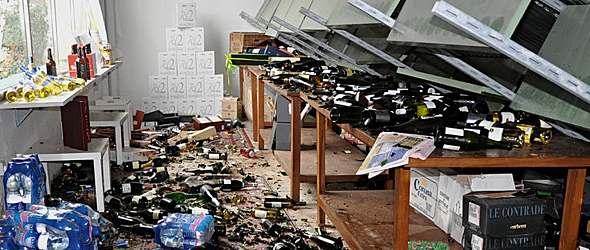A court in L’Aquila, a town in Italy’s Abruzzo region badly hit by an earthquake in April 2009, found Italy’s Serious Risks Commission guilty of providing “inaccurate, incomplete and contradictory” information on the risk of a major earthquake occurring. In other words, the commission did not cry wolf.
The commission, made up of some of Italy’s most respected experts in the field of seismology, was also found guilty of indirectly causing the deaths of 29 people, who, it was claimed, would have otherwise left the town before the earthquake struck a little over four days after the Serious Risks Commission met.
The decision of the Italian court has caused tremors within the world’s scientific communities. American and Japanese scientists labeled the sentence “absurd and dangerous”, at the same time pointing out that it is impossible to predict earthquakes.
Calling into question the objectivity of the court, it has come to light that the judge presiding over the case, and the prosecution, were all from the Abruzzo region of Italy.
Scientists in Italy have also been left shocked by the sentence. Members of the Serious Risks Commission have resigned stating that they can no longer offer advice to the Italian state.
Calls have been made to Italy’s President Napolitano to intervene, though so far, he has not.
Italy’s environment minister criticised the decision of the Abruzzo court, adding that he hoped the ruling would be overturned at appeal.
What Happened?
When called in to the town of L’Aquila after a magnitude 4.0 tremor had occurred on March 30, 2009, the meeting of the Serious Risks Commission gave the impression that the risk of a major earthquake occurring was low, or so the court alleged. As a consequence of the way in which the commission’s findings were interpreted some people apparently felt reassured enough that they returned to their homes.
A few days later, early in the morning of April 6, 2009, a powerful earthquake struck. The quake caused the deaths of over 300 people.
What reassurances?
Now, I have read the minutes, in Italian, of the meeting held by the Serious Risks Commission in Abruzzo on March 31, 2009.
I have to say that I would not have felt at all reassured by the observations made at the meeting. The comments do not appear to be at all “inaccurate, incomplete or contradictory”, either.
Here is a brief summary of the meeting:
- The head of the commission, Professor Barberi stated that is it extremely difficult to make predictions about the evolution of seismic events.
- Another member of the commission noted that as the Abruzzo region is normally seismically active, it is impossible to say that there will not be earthquakes.
- It was also pointed out by a member of the commission that, seeing as l’Aquila is in a high risk zone, attention must be paid to the construction of buildings in the area.
Upon this comment, perhaps certain buildings, such as the poorly constructed student halls of residence, should have been quietly evacuated. This did not happen.
- Furthermore, the commission observed that frequent low intensity tremors cannot be considered an indication that a strong earthquake might occur.
Read out of context, this statement could be interpreted as meaning that just because there are tremors, a major earthquake will not occur. In reality though, there are areas of Italy which suffer from tremors regularly and such tremors do not indicate that a major earthquake is on the way. The presence of tremors is simply not a reliable indicator one way or another.
- Interestingly, perhaps, commission member Profressor Dolce underlined the importance of paying particular attention to buildings used for educational purposes. Did he know something the others did not?
During the April 6 earthquake, the collapse of student accommodation did lead to loss of life. It is strongly suspected that the residence had not been constructed in accordance with building regulations designed to ensure structures are earthquake proof.

Stop reading, start speaking
Stop translating in your head and start speaking Italian for real with the only audio course that prompt you to speak.
At no point in the minutes did the commission state that an major earthquake could occur or would not occur. Indeed, the commission went to some length to stress that it is simply not possible to predict earthquakes.
Italian readers can see the minutes here: http://speciali.espresso.repubblica.it/pdf/terremoto/verbale.pdf
For underestimating the risk, and, therefore, allegedly causing the deaths of 29 people, the seven members of the commission – 6 scientists and one former civil protection agency official – were found guilty of involuntary manslaughter each was sentenced to a 6 year prison term.
An Enormous Error
I believe outcome of this case is an enormous error on the part of the, possibly biased, court which, at the end of the day, prosecuted the scientists for being unable to predict an earthquake – which is something experts around the world acknowledge is impossible.
The only member of the commission who might merit some punishment was not a scientist, but the ex-official of the civil protection agency – Bernardo De Bernardinis – who was also a defendant. The official announced there was “no danger.” To make such an assertion in an area known to be at high risk of earthquakes was perhaps irresponsible.
A few days later, and after 300 deaths, De Bernardinis was proven to be very wrong.
Appeals, Hopefully
None of the commission is yet languishing in an Italian prison because the case will proceed through at least one appeal stage. There is, however, still a chance that the scientists, and the ex-civil protection agency official, will end up behind bars.
Italy, and the rest of the world, is now waiting to discover on just what legal grounds the scientists and the official were found guilty. Details of the judge’s decision will appear in two months or so.
Unjust Italian Justice?
Has justice been served? Not really. In fact the case is making Italian justice look distinctly unjust in the eyes of the world.
Italy’s justice system is due to be reformed at some point in the near future, and the findings of the court in this case indicates the system is in serious need of reform. Italy’s court system has a reputation for being exceedingly slow – yet another reason for reforms to be introduced.
Whether the reforms, if they ever happen, will render Italian justice more just, is something that is probably as hard to predict as an earthquake.
Let’s hope this ridiculous judgement is overturned as soon as possible.
A nation with a court system that issues such decisions is highly unlikely to attract foreign direct investment, now is it?
—–
Image by: Mario Fornasari from Ferrara, Italy






